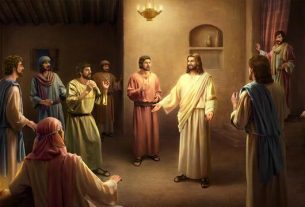There is a record in the Bible, “One of His disciples, Andrew, Simon Peter’s brother, said to Him, There is a lad here, which has five barley loaves, and two small fishes: but what are they among so many? And Jesus said, Make the men sit down. Now there was much grass in the place. So the men sat down, in number about five thousand. And Jesus took the loaves; and when He had given thanks, He distributed to the disciples, and the disciples to them that were set down; and likewise of the fishes as much as they would. When they were filled, He said to his disciples, Gather up the fragments that remain, that nothing be lost. Therefore they gathered them together, and filled twelve baskets with the fragments of the five barley loaves, which remained over and above to them that had eaten” (John 6:8–13).
Every time I see this passage about how the Lord Jesus fed five thousand with just five loaves of bread and two fish, I feel so shocked and can confirm more deeply in my heart that the Lord Jesus is indeed the one true God who supplies all things, commands all things, and can bring something out of nothing. I am also sure that even if there was no food at that time, the Lord Jesus could still perform this miracle to feed these five thousand people, or even more, because nothing is impossible for God. The Lord Jesus’ wondrous deed has become the foundation of my belief in and pursuit of Him.
Afterward, I saw the following passages of God’s words, which made me have an even deeper acceptance and knowledge of the Lord Jesus’ thoughts behind the miracle of five loaves and two fish.
God says, “First, let us try to understand what type of people these five thousand were. Were they followers of the Lord Jesus? From the Scripture, we know that they were not His followers. Did they know who the Lord Jesus was? Certainly not! At the very least, they did not know that the person standing in front of them was Christ, or maybe some people only knew what His name was and knew or had heard something about things He had done. Their curiosity about the Lord Jesus had merely been roused when they heard stories about Him, but you certainly could not say that they followed Him, much less understood Him. When the Lord Jesus saw these five thousand people, they were hungry and could only think of filling their stomachs, so it was in this context that the Lord Jesus satisfied their desire. When He satisfied their desire, what was in His heart? What was His attitude toward these people that only wanted to eat their fill? At this time, the Lord Jesus’ thoughts and His attitude were in relation to God’s disposition and essence. Facing these five thousand people with empty stomachs who only wanted to eat a full meal, facing these people full of curiosity and hope for Him, the Lord Jesus only thought of utilizing this miracle to bestow grace upon them. However, He did not raise His hopes that they would become His followers, for He knew that they just wanted to join the fun and to eat their fill, so He made the best of what He had there, and used five loaves of bread and two fish to feed five thousand people. He opened the eyes of these people who enjoyed seeing exciting things, who wanted to witness miracles, and they saw with their own eyes the things that God incarnate could accomplish. Although the Lord Jesus used something tangible to satisfy their curiosity, He already knew in His heart that these five thousand people just wanted to have a good meal, so He did not preach to them or say anything at all—He just let them see this miracle as it happened. He absolutely could not treat these people in the same way as He treated His disciples who truly followed Him, but in God’s heart, all creatures are under His rule, and He would allow all creatures in His sight to enjoy the grace of God when it was necessary. Even though these people did not know who He was and did not understand Him or have any particular impression of Him or gratitude toward Him even after they had eaten the loaves and fish, this was not something that God took issue with—He gave these people a wonderful opportunity to enjoy the grace of God. Some people say that God is principled in what He does, that He does not watch over or protect nonbelievers, and that, in particular, He does not allow them to enjoy His grace. Is that actually the case? In God’s eyes, as long as they are living creatures that He Himself created, He will manage and care for them, and in manifold ways He will treat them, plan for them, and rule them. These are the thoughts and attitude of God toward all things.
“Although the five thousand people who ate the loaves of bread and the fish did not plan to follow the Lord Jesus, He made no exacting demands of them; once they had eaten their fill, do you know what the Lord Jesus did? Did He preach to them at all? Where did He go after doing this? The scriptures do not record that the Lord Jesus said anything to them, just that He left quietly when He had performed His miracle. So did He make any requirements of these people? Was there any hatred? No, here were none of these. He simply no longer wanted to pay any mind to these people who could not follow Him, and at this time His heart was in pain. Because He had seen the depravity of mankind and He had felt mankind’s rejection of Him, when He saw these people and He was with them, He was saddened by human obtuseness and ignorance, and His heart was in pain, all He wanted was to leave these people as quickly as possible. The Lord did not make any requirements of them in His heart, He did not want to pay them any mind, and even more, He did not want to expend His energy on them. He knew that they could not follow Him, but in spite of all this, His attitude toward them was still very clear. He just wanted to treat them kindly, to bestow grace upon them, and indeed this was God’s attitude toward every creature under His rule—to treat every creature kindly, to provide for them and nourish them. For the very reason that the Lord Jesus was God incarnate, He very naturally revealed God’s own essence and treated these people kindly. He treated them with a heart of benevolence and tolerance, and with such a heart He showed them kindness.
“… Even though this is a story that people have been reading for several thousand years, it has a simple plot, and allows people to see a simple phenomenon, yet in this simple plot we can see something more valuable, which is God’s disposition and what He has and is. These things that He has and is represent God Himself and are an expression of God’s own thoughts. When God expresses His thoughts, it is an expression of the voice of His heart. He hopes that there will be people who can understand Him, know Him and comprehend His will, and who can hear the voice of His heart and will be able to actively cooperate to satisfy His will. These things that the Lord Jesus did were a voiceless expression of God” (“God’s Work, God’s Disposition, and God Himself III” in The Word Appears in the Flesh).
God’s words made me gain a new understanding of the story of five loaves and two fish in the Scripture. In the past, I had read this passage of scripture many times, but what I could understand was only God’s authority and ability, while I had no knowledge of the Lord Jesus’ thoughts, or the disposition and substance He revealed behind the miracle. Only through God’s dissection and revelation in this way did I know that what God had done was truly meaningful.
From God’s words, I saw that facing those people who just wanted to have a good meal but didn’t want to pursue the truth or seek an understanding of God, God only bestowed them with grace to make them full. This was God’s attitude. Even if they would not follow Him after they had eaten their fill, God didn’t have any requirements or hatred toward them in His heart. This was a revelation of His substance of beauty and goodness even more. Moreover, God knew that those five thousand people who had a good meal would not follow Him, so He did not get His hopes up that they would follow Him, and meanwhile God didn’t intend to say more to them. From this I knew that although God loves and treats people kindly, He is principled in His treatment of different kinds of people. As for those who believed in God but only wanted to eat their fill of His bread, God would bestow grace on them and treat them kindly, but He would not express His will to them. However, as to His disciples who truly loved the truth and followed Him, God would provide more truths to make them sated in their spirit and live amid His guidance and blessings.
In God’s words, I also saw the voice of God’s heart expressed to us behind the miracle of five loaves and two fish. Although many people come before God, if they believe in God just to eat their fill of His bread, and gain the peace of their flesh or blessings in the future, and do not pursue the truth or knowledge of God, they will never be able to gain God’s approval, much less gain the truth and life. The Lord Jesus said, “Truly, truly, I say to you, You seek Me, not because you saw the miracles, but because you did eat of the loaves, and were filled. Labor not for the meat which perishes, but for that meat which endures to everlasting life, which the Son of man shall give to you: for Him has God the Father sealed” (John 6:26–27). “If you continue in My word, then are you My disciples indeed; And you shall know the truth, and the truth shall make you free” (John 8:31–32). We can see that the Lord’s will is not to let us merely eat our fill of bread and obtain material enjoyment and blessings; instead, we should seek to gain the truth and abide by God’s way. No matter what happens in our real life, we should practice according to the Lord’s teachings and pursue to love and satisfy Him. Only thus can we obtain the truth, receive God’s promise, and gain eternal life. Now, have you grasped the thoughts of the Lord Jesus behind the miracle of five loaves and two fish?




